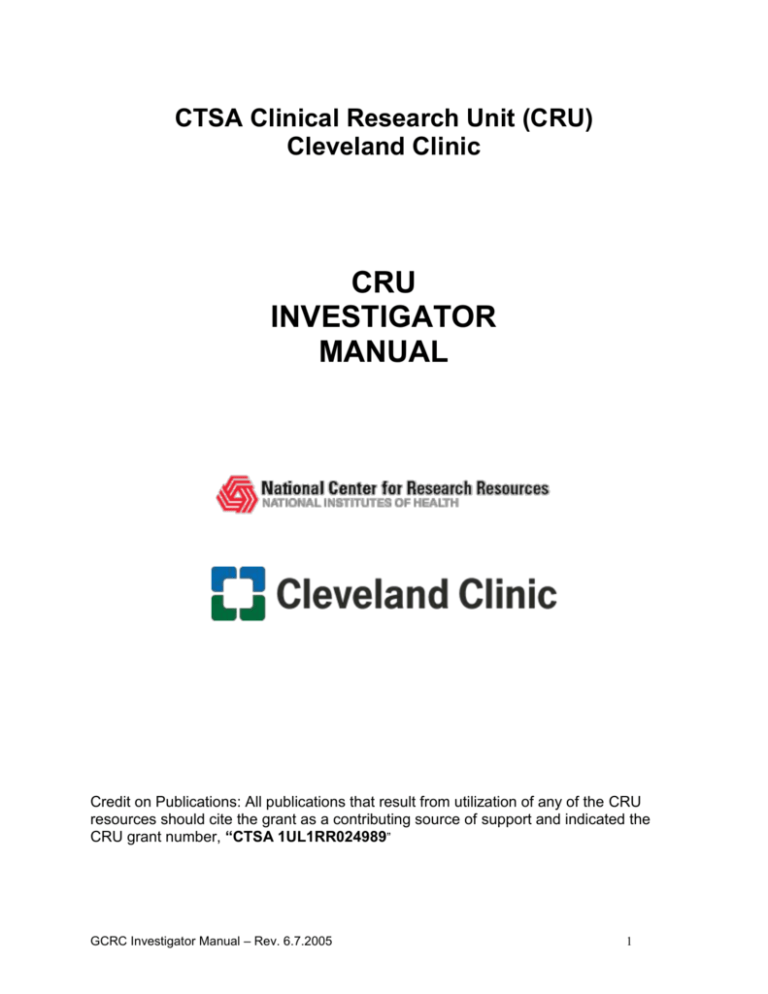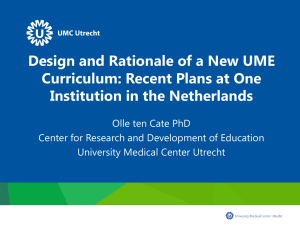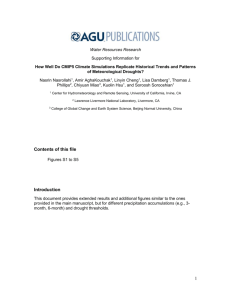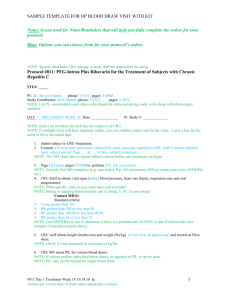GCRC Application and Protocol - Cleveland Clinic Lerner Research
advertisement

CTSA Clinical Research Unit (CRU) Cleveland Clinic CRU INVESTIGATOR MANUAL Credit on Publications: All publications that result from utilization of any of the CRU resources should cite the grant as a contributing source of support and indicated the CRU grant number, “CTSA 1UL1RR024989” GCRC Investigator Manual – Rev. 6.7.2005 1 INDEX Page Number Mission Statement Contact Information CRU Operational Flow Technical Resources Administration Application CRU Advisory Committee Resource Council Subject Categories Research Subject Advocate CRU Resources Nursing Core Laboratory Informatics Core Biostatistics Services Nutrition Pharmacy Study Initiation Required Documents Study Execution Scheduling Medical Record Management Scheduling Request Form Admission Procedures Annual Reporting GCRC Investigator Manual – Rev. 6.7.2005 3 3 4 5 7 7 8 9 10 12 12 15 15 16 17 18 19 20 20 21 22 23 2 MISSION STATEMENT The mission of the CTSA Clinical Research Unit (CRU) at CCF and the Cleveland Clinic Lerner College of Medicine of Case Western Reserve University (CCLCM) is to facilitate and enhance the performance of clinical research so as to help understand human physiology, translate basic research into patient care, and develop new therapies. This is done through the provision of core support for the design, implementation, and analysis of clinical studies. This includes inpatient and outpatient research space, the expertise of research nurses, a laboratory core, informatics core & biostatistics core, Research Subject Advocate (RSA), and research subject support. The CRU is also committed to providing an environment that ensures the training of the next generation of clinical investigators through support of young investigators and medical students. CONTACT INFORMATION Charlotte Bhasin, MOT, OTR/L Administrator / M51 216/444-5113 Fax: 216/636-3367 bhasinc@ccf.org Kay D. Stelmach, RN, RTT Nurse Manager / M51 216/444-3588 Fax: 216-636-3367 stelmak@ccf.org Jackie Soos Department Coordinator / M51 216/445-6018 Fax: 216/636-3367 soosj@ccf.org GCRC Investigator Manual – Rev. 6.7.2005 3 CRU OPERATIONAL FLOW Pre-application Assistance - Contact CRU at (216) 444-5113 Complete PI submits completed application with protocol and budget to CRU Administration to be reviewed for completeness. There, a database log and project file will be created. Copies of the application are distributed to RSA and Biostatistics for review. Not approved Incomplete PI will be contacted by CRU administration for missing info. CRU Workgroup Overview: RSA, Biostatistics, Core Lab, Nursing, Informatics. The WorkGroup will review the project, based on each respective WorkGroup member’s expertise, to identify any potential issues or problems with the project. Approved Not approved The application is forwarded to the CRU Advisory Committee (GAC) Chairman who will assign two GAC members to review and score the project based on scientific merit. Once completed, the reviews are presented before the GAC for further consideration. Comprised of hand-appointed CCF staff physicians of diverse specialties & expertise, the GAC considers the project’s scientific merits and assigns an overall score based on the reviews, scores, RSA and Biostatistics comments. Favorable Score Contact PI to answer questions or resolve issues. Unfavorable Score Depending on the outcome, the PI will receive a formal letter requesting to either revise their project, or that the project has been rejected outright. All reviews (with the reviewer’s made anonymous) are forwarded to the PI. If a revision is requested, then a designated mentor may be assigned to assist. All revisions must be received by the CRU within 90 days, or a new application must be submitted. Project is presented at Resource Council for approval of requested resources. Requested resources approved. Requested resources denied. A formal letter is sent to the PI to reconsider resources. A formal letter is drafted, signed by the CRU administrator, and sent to the PI-- listing the approved resources as requested in the original application protocol. GCRC Investigator Manual – Rev. 6.7.2005 4 CRU TECHNICAL RESOURCES The resources listed below are the not for the sole purpose of the listed disciplines, but are common CRU procedures available for current and future projects. Endocrinology/Gastroenterology Fat Balance Studies Indirect Calorimetry Glucose Tolerance Test Glucose/Insulin Clamp Studies 10 min and 3 hr Frequently Sampled Glucose Tolerance Test Continuous Insulin Infusion Endoscopy Nutritional assessment Cardio-pulmonary Exercise Stress Testing - cycle ergometry or treadmill EKG Bronchoscopy Pulmonary Function Testing Telemetry Plethysmography Pediatrics Pediatric IV Access and Phlebotomy Pediatric Advanced Life Support General Pharmacokinetic Studies Long-Line Blood Draws (Blood Sparing Technique) Continuous Pulse and BP Monitoring CADD Pump Infusion Conscious Sedation Central Line Site Care Peripheral Line Access and Maintenance GCRC Investigator Manual – Rev. 6.7.2005 5 Project Management Support CRU Equipment Blood gas and metabolite/electrolyte analysis (ABL 735) Centrifuges Fume hood Laminar Hood Incubators Microscopes PCR machine Electrophoresis equipment Freezers (-20c, -80c) 4c unit Elutriator Blood draw capability in both M51 and NC20 Flexible bronchoscopy Flexible endoscopy Harvard Dual Infusion Pump Plethysmography Indirect Calorimetry Pulmonary Function with Body Box Pulse Oximetry Negative Inspiratory Force Meter Telemetry Cycle ergometer Treadmill Doppler Bioelectrical Impedance Plate reader Spectrophotometer Gel documentation system GCRC Investigator Manual – Rev. 6.7.2005 6 ADMINISTRATION The CRU administrative office is located on the 5th floor of the M building, adjacent to the in-patient/out-patient unit. Grant management for the CRU is supported by the Administrative Director (AD) and a Program Assistant. Center administration for CRU protocols includes: CRU application process Budget and administrative review of CRU application Billing procedures, bill review and adjustments CRU Applications General CRU application Healthy donor lab draw only application CRU/RPC CREFF application These can be accessed through the CRU website http://info.research.ccf.org/dcr/gcrc/ or by contacting the administrative office. Administrative personnel will assist the investigator and/or the research coordinator with any questions. An application to the CRU can be made at any time during the IRB approval process. (CRU studies cannot be initiated until full IRB approval) The CRU team reviews applications in order to determine appropriate use of the CRU resources. Weekly operation meetings are held to review applications for funding source, bioethics, biostatistics, clinical and core lab resource issues. At this time recommendations are made to move the project forward for scientific review by the CRU General Advisory Committee (GAC) or tabled and returned to the Principal Investigator (PI) for recommended revisions. * Investigators may find it beneficial to meet with the CRU staff prior to submission of NIH grants CRU General Advisory Committee (GAC) The GAC is composed of a cross section of faculty members who are familiar with broad elements of research activity. Each project is reviewed and scored for scientific merit using the NIH review process. Applications to the CRU are judged on the quality of their science. NIH funded applications are given first priority. The General Advisory Committee (GAC) meets the 1st and 3rd Wednesday of each month. Any study initiated on the CRU must have (GAC) approval, or the written approval of the CRU Program Director, in the case of an expedited approval. If the GAC has recommended revision of the protocol as conditional to approval, the recommended revision(s) must be submitted and acknowledged as satisfactory by either the Administrative Director, or the GAC reviewer, as specified in the GAC correspondence. All review comments are sent to the PI. Correspondence is sent to the PI with the GAC comments. GCRC Investigator Manual – Rev. 6.7.2005 7 Resource Council Once a project has been approved for scienticific merit, the resource council meets to review and assigns requested resources. NIH funded applications are given first priority. Resource Council responsibilities include allocation of CRU resources. CRU Resources Nursing o Nursing staff is trained to support projects through complex research observations and precise collections of specimen while providing exemplary subject care Core lab o Perform complex laboratory procedures to provide reliable and accurate analysis of research specimens for CRU approved projects Ancillaries o An Ancillary is defined as a service routinely available through hospital departments for all patients. The CRU supports ancillary tests that are required for research purposes only that are outside of standard of care. CRU support is not available for services funded by the investigator’s grant, professional fees, lab work performed in the investigator’s lab, experimental tests done in a research laboratory outside of the CRU Core Lab or Imaging procedures. Resource council meets the 2nd and 4th Wednesday of each month and is comprised of the CRU grant PI, program directors and CRU administrative team. Correspondence will be sent to the PI outlining approved CRU resources. Resources are reviewed and awarded on a yearly basis. GCRC Investigator Manual – Rev. 6.7.2005 8 CRU SUBJECT CATEGORIES The CRU grant guidelines describe three administrative categories, which are used for all research protocols. A general description of each category is found below, with the billing method used. Billing instructions for all patients should be specified on the CRU reservation forms. Questions regarding these categories should be directed to the Administrative Director of the Administrative Program Coordinator. Research Patients - Category ‘A’ Research inpatient days or outpatient visits in an investigator-initiated study utilized solely for research purposes. All patient care costs are the responsibility of the CRU grant and the investigator’s research funds, with the exception of some Medicare Qualifying Clinical Trials (MQCT) that bill routine care charges. CRU services are fully supported for approved ‘A’ studies Research Service Patients - Category ‘B’ Research inpatient days or outpatient visits that involve patients admitted for diagnosis or treatment based on established standards of care. The CRU or investigator is responsible for research-related charges, while non-research care is billed to a third party carrier or the patient. Billed by CCF to a third party payor or the patient, EXCEPT for research related charges, which are applied to the CRU’s or the investigator’s research accounts before the bill is sent. Industry-Initiated Projects - Category ‘D’ Inpatient days and outpatient visits utilized for an industry study. Charges are the responsibility of the investigator and the sponsor. CRU approved resources are billed directly to the investigator’s CCF research account for the industry supported study. GCRC Investigator Manual – Rev. 6.7.2005 9 RESEARCH SUBJECT ADVOCATE (RSA) Under the guidance of the National Institutes of Health National Center for Research Resources (NCRR), this program is responsible for guarding the welfare of research participants during all phases of research activity to include study design, participant recruitment and enrollment, and research intervention and data collection. Accordingly, the RSA Program assists research subjects as well as members of the CRU research team. Specific functions include Assisting research investigators with protocol design, to include inclusion/exclusion criteria, recruitment plans, risk/benefit analyses and subject compensation. Assisting research investigators with the formulation and creation of Data and Safety Monitoring Plans (DSMPs) and Data and Safety Monitoring Boards (DSMBs). Auditing studies to ensure compliance with human subjects protections regulations. Monitoring adverse events. Evaluating conflict of interest disclosures. Facilitating research ethics training for all key study personnel. Witnessing or assisting the informed consent process. Providing study information to research subjects. Research Investigators Please contact the RSA Program office for assistance with protocol and data safety monitoring plan preparation, or concerns you may have about research participation and human research regulations. All protocols must be reviewed and approved by the RSA Program, as well as the General Advisory Committee (GAC) and the CCF Institutional Review Board (IRB), before the research project may begin. We advise you submit your CRU application first, rather than your IRB application. By submitting your protocol to the CRU first, your protocol, consent form and Data Safety Monitoring Plan will be reviewed and red-lined by the Research Subject Advocates. The RSA is 100% focused on research ethics and research subject protections. By making the changes suggested by the Research Subject Advocates, usually your documents will satisfy IRB research ethics requirements. Additionally, ALL adverse events (expected and unexpected) must be reported to the RSA Program office. Unexpected adverse events must be IMMEDIATELY reported to either Dr. Katrina Bramstedt or Ms. Katy Kassimatis either in-person, by phone, or by pager. These CRU reporting requirements are in addition to those of the IRB. GCRC Investigator Manual – Rev. 6.7.2005 10 RSA Contact information Carmen Paradis M.D., M.A. Director, CRU Research Subject Advocate Program Bioethics, Associate Staff JJ60 216-445-2767 Fax 216-444-9275 Pager 28848 paradic@ccf.org CRU Links: RSA policies & forms (website under construction, please contact the RSA directly) CRU policies & forms (website under construction, please contact the CRU directly) IRB policies & forms (http://intranet.ccf.org/irb/general/IRBPoliciesAndProcedures.doc) CCF Dept. of Bioethics (http://www.clevelandclinic.org/bioethics/) Other Links: FDA (www.fda.gov) NIH (www.nih.gov) OHRP (http://ohrp.osophs.dhhs.gov) Belmont Report (http://www.hhs.gov/ohrp/humansubjects/guidance/belmont.htm) GCRC Investigator Manual – Rev. 6.7.2005 11 RESOURCES The CRU resources include a 7-bed research inpatient/out-patient unit located on the 5th floor of the M building (M51). The CRU, funded by NCRR, provides a controlled environment to do patient-oriented research. Nursing Resources Experienced research nurses staff both the inpatient and outpatient areas. Nurses are experienced in a variety of specialties and with continuing education maintain expertise to support a wide range of studies from various disciplines. The research nursing staff is familiar with initiating and maintaining time-oriented research procedures ranging from the simple to complex. Annual competency-based training insures proficiency in research procedures. Additional training for research-specific procedures is instituted as new studies are initiated. Procedure rooms with capability for bronchoscopy, PFT, endoscopy, muscle biopsy, and other research modalities are located adjacent to the patient rooms. A Phlebotomy satellite station is located on the second floor of the Lerner Research Institute for studies using healthy donor samples. Core hours of the unit are 8:00am to 5:00pm. Alternative staffing is determined based on specific protocol needs. Nursing Contact Information Kay D. Stelmach, RN, RTT Nurse Manager / M51 216/444-3588 Fax: 216-636-3367 stelmak@ccf.org Core Laboratory Resources The CRU Core Laboratory is located in Room M51-23. The Core Laboratory facility has capability for molecular biology, specimen processing and analytical work. In addition, the CRU is able to support some work done through the Imaging (microscopy), Flow Cytometry, and Mass Spec cores. The Core Laboratory is currently authorized and equipped for the use of radioactive materials. The primary functions of the Core Laboratory are to: Provide technical support for sophisticated clinical research assays Develop or validate new laboratory analysis methods GCRC Investigator Manual – Rev. 6.7.2005 12 The Core Lab can provide manpower for specific laboratory procedures, but resources for supplies are limited. The Core Lab should be contacted to discuss the costs of specific tests. Investigators are strongly encouraged to discuss experimental details with the Core Laboratory prior to the beginning of a study to ensure that the Core Laboratory can meet study needs appropriately. Investigators should contact the core lab about the possibility of adding or supporting other laboratory assays not specified here. Specimen Processing The Core Laboratory can perform minimal to complex specimen processing. Among its services are: Blood, serum, plasma or urine aliquots DNA and RNA Isolation Elutriation for large quantity blood cell separation o Lymphocyte and Monocyte isolation Research Assays The Core Laboratory can provide assays for research purposes. Blood profile o pH o Hematocrit o Hemoglobin o Oximetry o Glucose o Lactate o Bilirubin o Potassium o Calcium o Chloride o Sodium ELISA and colorimetric assays CRU support for the Imaging core includes the following services Confocal microscopy Confocal microscopy with assistance Digital image analysis Digital microscopy with assistance Image processing Live video microscopy 6-24 hours Live video microscopy up to 6 hours LMD (laser microdissection) LMD with assistance GCRC Investigator Manual – Rev. 6.7.2005 13 CRU support for the Flow Cytometry Core includes the following services Acquisition and Analysis o FACScan – (analysis) o FASCVantage – (Sterile cell sorting) o LSR – (Multi-color analysis) Consultation o Experimental Design o Interpretation o Troubleshooting Mass Spec Core Please inquire with the core lab regarding CRU-supported mass spec assays. CRU Core Lab Policies Subject demographic information is required for year-end reporting to the NIH. If demographic information is not provided to the laboratory, all work must be billed to the investigator’s grant. The CRU cannot support work for which no demographic information is provided. Samples must be received in an organized and understandable manner. All samples must be clearly labeled, accompanied by a spreadsheet listing the sample identification along with demographic information. The Core Lab will inventory samples. Any samples that do not match the requisition will be returned to the investigator. Specimen Storage The Core Laboratory has access to a 4°C refrigerator, one upright –20°C and one -70°C freezer for short-term specimen storage. All refrigerators and freezers are equipped with centrally monitored alarm systems for efficient and accurate temperature control. The Core Lab does not provide long-term storage of samples. Specimen Shipment The Core Laboratory has the capability to ship out samples either 1) Ambient, 2) Ice packed, or 3) Dry Ice to designated laboratories. Investigators are asked to provide shipping labels that include an account number. The Core Lab cannot pay for shipping charges. GCRC Investigator Manual – Rev. 6.7.2005 14 Core Laboratory Contact Information Teresa Markle, BS CRU Core Lab Research Technologist / M51 216/445-5470 Fax: 216-636-3329 marklet@ccf.org Informatics Core Resources It is anticipated that CRU clinical investigators publish their scientific findings. In order to produce quality data collection, the bioinformatics team explores and implements technologies for design of data management tools and methodologies. Informatics Core Contact Information Chuck Trunick CRU Systems Analyst / M51 216/445-6933 Fax: 216-636-3367 trunicc@ccf.org Biostatistics Resources The CRU biostatisticians are available to assist investigators with the design, analysis and presentation of research studies. This includes defining an appropriate study design and sample size to insure that the investigator’s research questions can be reliably answered; defining and coordinating appropriate data analyses; and helping with abstract, manuscript, and presentation preparation. Biostatistics Contact Information James Bena, MS Senior Biostatistician / Wb4 216/445-2336 benaj@ccf.org GCRC Investigator Manual – Rev. 6.7.2005 15 SERVICES Nutrition Services The CCF CRU does not have a full time Research Dietitian. CRU resources for Nutritional studies can be requested from an associated CRU to provide scientifically controlled dietary regimens needed for inpatient and outpatient studies. Services available to support the dietary components of the research protocols Energy balance/Body Composition Assessment Bioelectrical Impedance including single and multi-frequency Basal and Thermal Energy Expenditure measurements Controlled Diets Diets are specifically designed to meet the research objective and nutrient requirements of the subject. The meals are provided to the subjects and are rigidly controlled. These diets are provided to inpatients in the hospital or on an outpatient basis. The subject can pick meals once a day. Diet compliance is monitored on a daily basis. Nutrient Analysis Nutrient analysis can be performed based on 24-hour diet history or Food Frequency according to the particular protocol’s needs. Weighed Diets Diets with known nutrient content are served to the subjects and actual nutrient composition of the diets is analyzed after they have consumed the meals. Nutritional Instruction Diet instructions to meet the objective of the study and follow up for dietary compliance are provided. Meal Service Subjects who are at the CRU for more than 4 hours will be provided with meals. General and routine diets for subjects without diet modifications for research purposes will receive their meals from the main kitchen. All meals requiring diet modifications for research will be under the direction of a dietician. Contact the Administrative Director for an application for dietary needs from an adjacent CRU. GCRC Investigator Manual – Rev. 6.7.2005 16 PHARMACY Contact John Petrich, RPh Investigational Drug Studies Coordinator regarding all nonchemotherapeutic drugs that will be stored and dispensed by the pharmacy. Contact Sam Calabrese, RPh for all chemotherapeutic drugs that will be stored and dispensed by the pharmacy. To ensure that all drug-dispensing details are verified, involve the research pharmacy early in your planning process. Your grant will be responsible for pharmacy start up charges and for charges associated with preparing each dose of your study drug. Make certain that drug is available prior to scheduling the first subject Study drug not requiring special preparation and storage can be stored in the secure site on the CRU. Conte Suttles, CPhT, will be making quarterly QA visits to the CRU. All study drugs will be logged. Daily Medications Category A patients that will be staying overnight in the CRU will be asked to bring their prescription medications to their research visit. These medications will be verified with the physician orders by a registered pharmacist and labeled. The medications will be kept in the CRU Pyxis system and dispensed as ordered. Pharmacy Contact Information: John Petrich, RPh Investigational Drug Studies Coordinator / Hb03 216/444-1128 Fax 216-445-5554 Pager 21586 petricj@ccf.org Sam Calabrese, RPh Pharmacy / R41 216/444-8068 Pager 24525 calabrs@ccf.org GCRC Investigator Manual – Rev. 6.7.2005 17 STUDY INITIATION Required Documents Before initiating a study, it must have full IRB approval for the protocol version, and all current amendments that are to be initiated. A copy of the IRB approval letter for the study, and a clean copy of all IRB stamped and dated Consent documents must be received in the CRU administrative office. In order to meet NIH requirements for training in human subjects’ protection, all Principal Investigators and key personnel of clinical research projects must complete the University of Miami’s CITI (collaborative IRB training initiative) web-based course. A copy of the grade book and completion report for all active research personnel must be submitted to the IRB with the IRB study application. The CITI course is accessible at www.citiprogram.org If the final budget was not available at the time of GAC review and approval, a final budget must be reviewed and approved by the Administrative Director. Significant budget changes not discussed with the Administrative Director could result in a delay in the initiation of the study. If the protocol will be using a research memo account, the memo account must be established and activated prior to requesting a CRU reservation for the first patient. The memo account number should be communicated to the Administrative Director or the CRU unit secretary. If the protocol is category ‘D’, the research account application should accurately list CRU charges, and must be reviewed by the CRU Administrative Director before the application is submitted to the Office of Research. A Data and Safety Monitoring Plan must be submitted and approved by the CRU, RSA and the GAC prior to study initiation. If your study has a Data Safety and Monitoring Board, the membership list and charter must be submitted with your application for GAC review. Questions regarding required documents, assistance with clarification or additional information about the application process should be directed to the CRU Administrator, at 216/444-5113. GCRC Investigator Manual – Rev. 6.7.2005 18 Study Execution Prior to the initiation of a study on the CRU, a protocol meeting is recommended. This provides an opportunity for CRU staff and the investigator to discuss the study procedures, lab techniques, case report forms, source documentation and supply needs for the study. Arrangements will be made to conduct the protocol meeting on a day when the greatest numbers of staff that will be involved with your study are available. To arrange a protocol meeting contact the Clinical Nurse Manager or the CRU Administrator. Investigators and their research team are strongly encouraged to discuss experimental details and attend a meeting with the Core Laboratory prior to the beginning of a study to ensure that we can meet study needs appropriately and that all details for specimen processing are clear. Standard operating procedures (SOPs) for specimen processing are written to ensure that all specimens are collected and processed in accordance with the approved instructions specific for each protocol The CRU has developed some preprinted order sheets to assist physicians in the admission process. The principal investigator should prepare physician’s orders and, if needed, a flow sheet for the study. Orders should be kept simple and straightforward; outlining what is to be done by the nurse (e.g. blood draws, frequency of vital signs, medication administration and physicians to be notified in case of emergency. If blood specimens are to be drawn, please include the type of tube in which the specimen should be drawn, and any special handling instructions. If special processing is needed, provide specific instructions. Include which lab the specimens are to be sent or will be picked up by you or a designee. The Principal Investigator must sign a finalized copy of orders Flow sheets can be devised for studies when serial specimens are to be obtained, medications are to be given, or procedures are to be performed at very specific time points over the course of the patient’s visit. A well-devised flow sheet will enable all staff to easily determine procedures at a glance. This minimizes the chance of mistakes and ensures that the study is run properly and clean data is collected. Electronic charting is available in the CRU. Once the orders and flow sheets have been revised and approved by the principal investigator, a smart text is often created to capture all of the study procedures and provide solid source documentation. GCRC Investigator Manual – Rev. 6.7.2005 19 Scheduling All appointment requests should be faxed to (216) 636-3329 using the attached Scheduling Request Form. Appointments are scheduled on a first come, first serve basis. Booking an appointment is done based on availability of space, nursing and lab personnel. When booking an appointment, have at least two dates in mind. As space and staffing is limited, please be flexible when arranging dates with your subjects. Should scheduling conflicts arise “A” studies supported by NIH funding are given priority when scheduling visits. NIH “A” studies can override another booking of an appointment is made 7 days in advance of the desired date and the “bumped” booking is not on a fixed schedule. It is suggested that to request that recurring appointments for an entire protocol cycle. Medical Record Management Inpatient records will be kept using CCF Admission packet and Nursing Progress Record. All assessments and charting will follow CCF policy. Outpatient visits are recorded in Epicare. Study specific smart texts are developed to capture all study procedures and all pertinent study data. Hardcopy source documents will be placed in study binders and returned to the study coordinators. All Investigators are responsible for their research records. There is no storage space available on the CRU for case report forms or research files. GCRC Investigator Manual – Rev. 6.7.2005 20 CCF CRU Research Subject Scheduling Request Form (Fax this completed form to 216-636-3329) Subject Name ___________________________________________ CCF# ____________________ Primary Investigator/phone ____________________________________ Study Coordinator/pager______________________________________ Protocol/ IRB#__________________________________________________ Type of Visit: _______Inpatient Visit _______Outpatient Visit Diagnosis: (for admissions) _______________________________________ Date(s) Requested _________________________________________ Admission time Requested __________________________________ Special Needs ____________________________________________ Comments: Requested By ________________________ Fax Number ___________________ Phone ________________________ Pager _________________________ Email ____________________________________ Your request is not confirmed unless you get a return call, email or fax from the CRU. Please call 445-8526 if you do not get a response within 24 hours. CRU to fill in information below: _________________ was notified via ______________ of the following confirmation information:___________________________________________________________________ ____________________________________________________________________________ _______________________________________________________________ GCRC Investigator Manual – Rev. 6.7.2005 21 Admission Procedures Category “A” subjects requiring an overnight stay will be admitted to M51. Category “B” subjects will be evaluated on the complexity of their standard of care needs and admitted to M51 unless subject care and safety could best be met in another care area. CCF standard admission charting will be completed on all patients on M51 at midnight. Admissions will not be arranged if the PI or his study team cannot provide coverage. CRU Admission policy is attached. CRU Nursing Admission Policy *Documentation Requirement for Inpatient Admission to the CRU Patients who are admitted to the CTSA Clinical Research Unit require a high standard of documentation by virtue of their voluntary participation in a research study. Physician Documentation Requirement 1. All subjects admitted to the CRU for participation in a research study will have documentation of a recent medical history and physical on the chart before the initiation of any research procedures. The history and physical must have been obtained or verified within the 30 days prior to admission. 2. All subjects will have signed study-specific standardized research orders on the chart before the initiation of any research procedures. 3. All subjects will have a study-specific, IRB-stamped consent form on the chart before the initiation of any research procedures. a. The consent form must be the most current IRB-approved version. b. The consent form must be signed and dated by either the subject (or guardian) and the physician or study coordinator witness on the same date. c. The investigator’s team is responsible for providing a copy of the consent form for the chart for subsequent study visits if the CRU does not have a copy. 4. All subjects must have a daily physician visit note entered into the chart for every 24 hours that they are on the CRU. A note must be entered upon discharge describing the subject’s response to any study drugs or testing agents administered, including a complete description of any adverse events and required treatments. 5. Any patient on M51 at midnight is considered a CRU admission and will require the above documentation. CRU Nursing Documentation Requirement 1. 2. 3. 4. The CRU nurse assigned to a patient admitted to the CRU for participation in a research protocol will complete the CCF adult or pediatric Nursing Admission Assessment Form, medication records, and all other baseline documentation required according to CCF Nursing Policies, prior to the initiation of any research study procedures. In addition, the nurse will provide narrative documentation of the subject’s understanding of the research protocol, and willingness to participate. CRU Nurses will document narrative observations on each research subject once every 24 hours. All protocol-specific study flow sheets will be completely and legibly filled in with black ink to be used as source documentation for the research protocol. GCRC Investigator Manual – Rev. 6.7.2005 22 ANNUAL REPORTING The CRU is required to submit an Annual Report of scientific progress and an annual financial status report within 90 days after completion of the grant year. These reports are reviewed by NIH and are used for planning and evaluation. Through these reports, NIH is kept apprised of current research activities and accomplishment at the CRU for Congressional reports and budget justifications and other reports. Subject enrollment demographic data will be provided to the CRU on a quarterly basis. This information will be reported on the annual report. The primary investigator will be requested to submit a project summary and a list of publication(s) resulting from the utilization of the CRU. GCRC Investigator Manual – Rev. 6.7.2005 23





